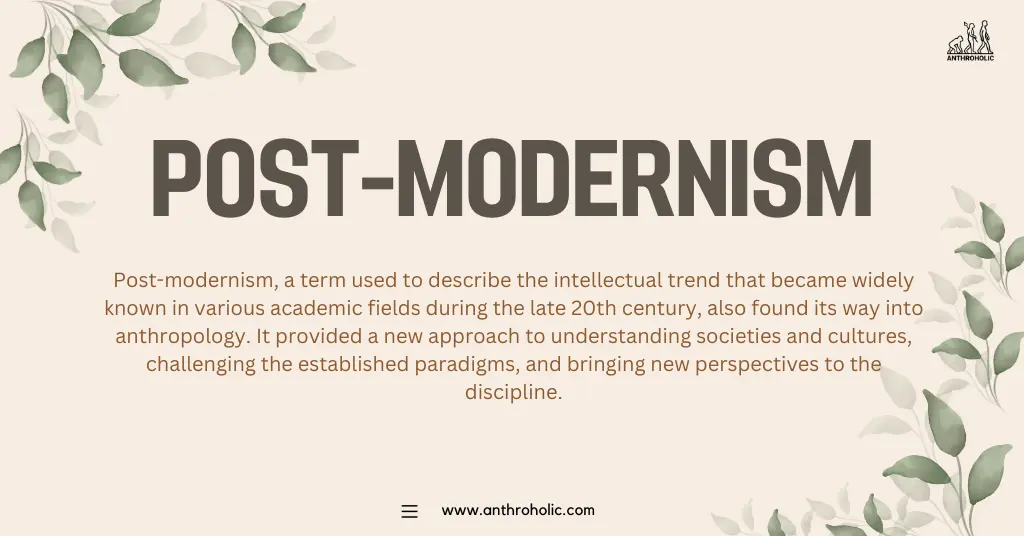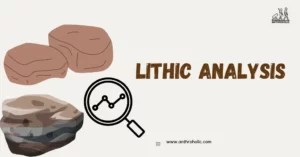AI Answer Evaluation Platform Live Now. Try Free Answer Evaluation Now
Post-Modernism in Anthropology
Post-modernism, a term used to describe the intellectual trend that became widely known in various academic fields during the late 20th century, also found its way into anthropology. It provided a new approach to understanding societies and cultures, challenging the established paradigms, and bringing new perspectives to the discipline [1].

A Brief Overview of Post-Modernism
To comprehend post-modernism in anthropology, one must first understand the post-modernism movement itself. Post-modernism rejects grand theories and ideologies, focusing on power structures, language, and cultural relativism. It seeks to question the perceived reality, instead focusing on individual experience and interpretations [2].
- Cultural Relativism: Cultural relativism is the principle that an individual’s beliefs and activities should be understood in terms of their own culture [3].
- Power Structures: Post-modernists scrutinize power structures and hierarchies, which they argue can distort the truth and marginalize certain groups.
- Language: Language is seen as a tool that shapes our understanding of reality rather than just reflecting it.
Emergence of Post-Modernism in Anthropology
In the 1980s and 1990s, post-modernist thought began influencing anthropology [4]. Post-modernism offered a way to critically analyze the discipline’s methodologies and assumptions, causing anthropologists to rethink their understanding of culture and society.
- Critique of Ethnography: Post-modern anthropologists criticized traditional ethnography, arguing that it often represents a western-centric viewpoint [5].
- Focus on Voices of the Marginalized: They emphasized including marginalized voices and perspectives, thus aiming for a more inclusive view of cultures.
- Questioning of Objectivity: Post-modernists challenged the notion of objective truth, arguing that truth is subjective and influenced by individual experience and perspective.
Post-Modern Anthropology’s Influence on Research Methods
Post-modernism in anthropology has had a profound effect on the research methods used in the field. Two of the most notable impacts are discussed below:
Reflexivity in Ethnography
Reflexivity refers to the process of a researcher reflecting on their own impact on the research and acknowledging their biases. Post-modern anthropology argues that the presence of a researcher in a culture can influence the behavior of the subjects being studied [6].
Multivocality
Post-modern anthropology advocates for the inclusion of multiple perspectives in research, known as multivocality. This includes taking into account the voices and perspectives of subjects being studied, rather than relying solely on the interpretations of the researcher [7].
Effects of Post-Modernism on Anthropological Theory
Post-modernism had a substantial influence on anthropological theory, mainly on the understanding and interpretation of culture.
- Deconstruction of Culture: Post-modern anthropology tends to deconstruct culture, arguing that it is not a fixed entity, but is instead fluid and ever-changing.
- Relativistic View of Culture: It argues for a relativistic view of culture, asserting that no culture is superior or inferior to another.
- Interpretative Approach: It promotes an interpretative approach to culture, where the focus is on understanding cultures from the point of view of those who are a part of it [8].
Table 1: Key Shifts in Anthropology due to Post-Modernism
| Traditional Anthropology | Post-Modern Anthropology |
|---|---|
| Focus on Objectivity | Acknowledgement of Subjectivity |
| Single Perspective Analysis | Multivocality |
| Culture as a Fixed Entity | Culture as a Fluid and Changing Phenomenon |
Conclusion
Post-modernism has significantly shaped anthropology, bringing in new approaches to studying and understanding cultures and societies. It has fostered a more inclusive and reflexive discipline, and though it has received criticism for its relativistic stance, it has undeniably left a lasting impact on the field [9].
References
[1] Appignanesi, R., & Garratt, C. (2007). Postmodernism for beginners. Cambridge: Icon Books.
[2] Lyotard, J. F. (1984). The Postmodern Condition: A Report on Knowledge. Manchester University Press.
[3] Herskovits, M. (1972). Cultural Relativism: Perspectives in Cultural Pluralism. Vintage.
[4] Clifford, J., & Marcus, G. E. (1986). Writing culture: the poetics and politics of ethnography. University of California Press.
[5] Said, E. (1978). Orientalism. Vintage Books.
[6] Rosaldo, R. (1989). Culture and Truth: The Remaking of Social Analysis. Beacon Press.
[7] Marcus, G. E., & Fischer, M. M. (1999). Anthropology as Cultural Critique: An Experimental Moment in the Human Sciences. University of Chicago Press.
[8] Geertz, C. (1973). The Interpretation of Cultures: Selected Essays. Basic Books.
[9] Hollis, M., & Lukes, S. (1982). Rationality and Relativism. MIT Press.



